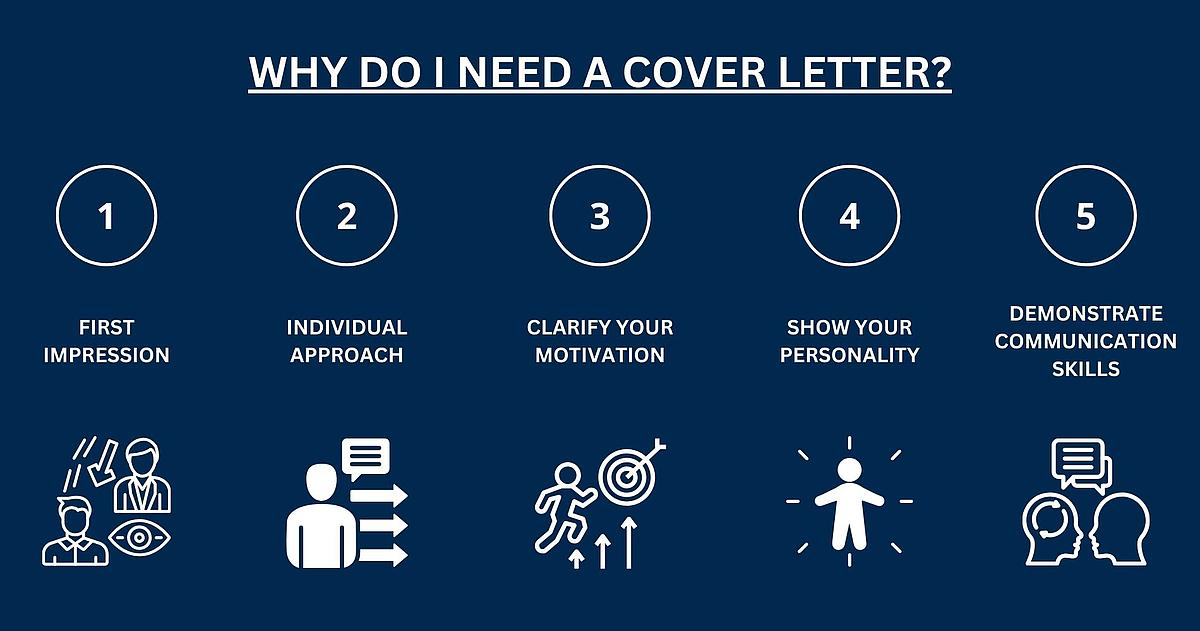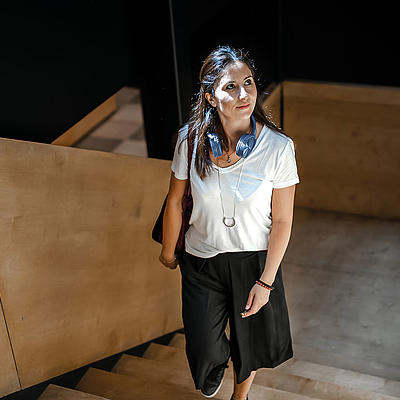This Website uses cookies to improve your visit on our website. More Info
Cover letter: This is what you are doing wrong!
A Cover Letter is the first impression a potential employer gets of you. It gives you the opportunity to present your qualifications, motivation and personality in a convincing way. A well-written Cover Letter can make all the difference and pave the way to an interview. In this article, you will find out what is important when writing a successful cover letter, what content is particularly important and how you can avoid typical mistakes.
What is a Cover Letter?
A Cover Letter, often referred to as a cover letter, is an important part of an application portfolio. It serves to give the potential employer a first impression of the applicant and to explain why they are interested in the advertised position and why they are the right candidate for it.
In a Cover Letter, the applicant presents their skills, experience and qualifications that are relevant to the advertised position. It is not just a matter of repeating the résumé, but of specifically explaining how your strengths match the company and the advertised position. A well-written Cover Letter is concise, individually tailored to the job in question and arouses the reader's interest so that they want to examine the application in detail.
The Cover Letter should be clearly structured and ideally fit on one page. It usually begins with a personal salutation, followed by an introductory sentence designed to arouse the employer's interest. In the main section, the applicant's relevant experience and qualifications are presented before the letter ends with a positive closing paragraph and a polite invitation to an interview.
If, after successfully writing your Cover Letter, you are still looking for information for your résumé, your subsequent job interview or your salary negotiation in the job interview, then take a look at our corresponding pages. Many exciting tips and tricks are waiting for you.
To the overview page of the Guide topicsDifference: Cover Letter & Letter of Motivation
This table should give you a clear overview of the main differences between a Cover Letter and a motivation letter.
| Aspect | Cover Letter | Letter of Motivation |
|---|---|---|
| Purpose | Introduction to the application, explanation of suitability for the position. | Detailed presentation of motivation and enthusiasm for a particular position, study or project. |
| Content focus | Brief introduction, qualifications, experience, reference to the position. | Personal motives, motivation, future goals and why exactly this position or this program. |
| Length | Usually 1 page. | Can be longer, usually 1-2 pages. |
| Target group | Employers, HR managers. | Employers, universities, foundations, organizations. |
| Structure | Formal: salutation, introduction, main body, conclusion. | Can be more flexible: personal tone, more focused on motivation. |
| Use | Part of a job application. | Mostly for special programs, scholarships, universities, projects or in addition to the application. |
| Focus | Presentation of suitability for the specific position. | In-depth presentation of motivation and personal motives. |
| Personalization | Strongly tailored to the advertised position. | More focused on your own goals and convictions, can be more universal. |
| Example | “I have five years of experience in marketing, which is ideally suited to the advertised position.” | “Marketing fascinates me because it bridges the gap between creativity and strategy.” |
Why do I need a Cover Letter?
A Cover Letter is an indispensable part of a successful application for several reasons:
Overview: Why do I need a Cover Letter?
The following graphic provides a brief overview of the reasons why you need a Cover Letter when applying for a job.

Explanation: Why do I need a Cover Letter?
Overall, the Cover Letter is a central part of the application process that gives you the chance to stand out from other applicants and make a lasting impression.
First impression
The Cover Letter is often the first document that a potential employer reads. It offers the opportunity to make a positive first impression and arouse the employer's interest.
Individual approach
While the résumé mainly contains facts such as your apprenticeship and professional experience, the Cover Letter allows you to address the employer personally. Here you can specifically address the requirements of the position and explain why you are the ideal candidate.
Clarify your motivation
In your Cover Letter, you can express your motivation and enthusiasm for the advertised position and the company. This is particularly important to show that you are not just looking for any job, but have made a conscious decision to apply for this position.
Show your personality
The Cover Letter gives you the opportunity to showcase your personality and stand out from other applicants. It allows you to highlight your strengths and soft skills that may not come across so clearly in your résumé.
Demonstrate communication skills
A well-written Cover Letter shows your ability to communicate clearly and persuasively. This is an important skill that is valued in many professions.


Linguistic features
of the Cover Letter

Linguistic features of the Cover Letter
| Tip | Explanation | Example |
|---|---|---|
| Choose a professional tone | Use formal but not stiff language. Avoid colloquial language, abbreviations (such as “e.g.”) or slang. | For example, instead of “I think the job is cool”, use “The advertised position particularly appeals to me because...”. |
| Use active instead of passive sentences | Active sentences appear more dynamic and show initiative. Active sentences emphasize your actions and successes directly. | Instead of “I led the campaign”, write “I led the campaign”. |
| Avoid unnecessary filler words | Avoid vague formulations such as “perhaps”, “possibly” or “somehow”. Be specific and precise in your statements. Instead of “some experience”, write “three years of experience”. | Instead of “I think I could be a good fit for the team”, write “I am convinced that I would be a good fit for the team”. |
| Emphasize your strengths | Focus on positive aspects of your experience and skills. Avoid emphasizing weaknesses or making excuses for any gaps in your résumé. | Instead of “Although I still have little experience, I would still like to apply”, write “I am motivated to expand my knowledge through this position and contribute to the success of the team with my willingness to learn.” |
| Focus on the added value for the company | Make sure that not every sentence starts with “I”. This quickly comes across as egocentric. The focus should be on how you can help the company, not just on what you want. | Instead of “I have experience in project management”, say “With my experience in project management, I help to implement projects efficiently and purposefully.” |
| Be yourself | Try to maintain an authentic voice that reflects your personality. Exaggerations or unnatural formulations quickly come across as untrustworthy. | Instead of “I am the perfect candidate”, a more authentic formulation could be “I am convinced that my skills are a good match for the requirements of this position.” |
| Don't use hackneyed phrases | Phrases like “I am hereby applying for...” are outdated and uninspiring. Instead, you can score points with an individual introduction that directly addresses the position. | Instead of “I read your job advertisement with great interest”, “The opportunity to work as [job title] at [company name] particularly appeals to me because...” might be more appropriate. |
| Correctness is a must | Pay attention to correct grammar, punctuation and spelling. Mistakes leave an unprofessional impression. If in doubt, have another person proofread your letter or use professional spellcheckers. | |
| Back up your statements | Instead of remaining general, emphasize your statements with concrete examples from your professional experience. This makes your application more tangible. | Instead of “I am a team player”, say “In my previous job, I have successfully worked in various interdisciplinary teams and successfully implemented projects such as XYZ.” |
| Show confidence in your abilities | Be confident, but not arrogant. Show that you believe in your abilities without appearing arrogant. | Instead of “I am the best candidate for this job”, “My experience and skills make me a strong candidate for this position” might be more appropriate. |
In a Cover Letter, you should pay attention to certain linguistic features in order to appear professional, clear and convincing. These are some important points to bear in mind. These linguistic features will help you to write a cover letter that comes across as professional, clear and convincing without losing any of its authenticity.
Cover Letter Structure: What should be included in a cover letter?
A Cover Letter should be clearly structured and well-thought-out in terms of content in order to make a positive impression. The structure of a cover letter is divided into several key sections:

- Header (sender and recipient)
- Sender: Your full address, telephone number and e-mail address.
- Date: The date of the letter.
- Recipient: Name of the contact person (if known), position, name of the company and the full company address.
- Subject line
- The subject line contains the exact name of the position you are applying for, including reference numbers if applicable. Example: “Application as Marketing Manager (Ref. No. 12345)”.
- Salutation
- A personal salutation is ideal (“Dear Mr. Müller”). If you do not know your name, you can also use “Dear Sir or Madam”.
- Introduction
- The introductory sentence should arouse the reader's interest. Here you briefly explain why you are applying and how you became aware of the position. Try to start with an original or personal sentence that arouses curiosity.
- Main part
- Motivation: Explain why you are interested in this position and this company. Show that you have researched the company and the position.
- Qualifications and experience: Highlight your relevant professional experience and qualifications that make you particularly suitable for the advertised position. Address the specific requirements of the position and show how your skills and experience fit in.
- Strengths and soft skills: In addition to professional qualifications, you can also emphasize your soft skills and personal qualities that are important for the position.
- Closing paragraph
- In the closing paragraph, express your anticipation of a personal interview and show that you are open to further steps. For example: “I am very pleased to be invited to a personal interview.”
- If applicable, state your earliest possible starting date and your salary expectations if this is requested in the job advertisement.
- Greeting and signature
- Conclude the letter with a polite greeting (“Yours sincerely”).
- Then add your handwritten signature (often a scanned signature for electronic applications) and your full name.
- Attachment note
- At the end of the cover letter, you can optionally refer to the enclosed attachments (e.g. résumé, certificates). This is done by adding the note “Attachments: résumé, certificates”.
A structured and well-thought-out Cover Letter increases your chances of attracting positive attention and being invited to an interview.
Cover Letter Examples & Checklist
TIP FROM A PROFESSIONAL: The more experience you have, the less important the Cover Letter is
In concrete terms, this means that if you are looking to change industries or simply want to start a new job, the Cover Letter is the perfect opportunity to explain your motivation. Why do you want to work in this field? What appeals to you? Etc.
However, if you are already an old hand in the field, then your experience and career history usually count much more. What have you done so far? How often have you changed jobs? Etc. You're more likely to find out such details from your résumé.
To summarize, the more experience you have and the higher the position you are aiming for, the less importance is placed on passion in the Cover Letter.
Key questions: What the employer wants to know
By answering these questions specifically in your Cover Letter, you increase your chances of standing out positively and being invited for an interview.
Why are you applying for this position?
The employer wants to understand why you have chosen this position and this company. Your motivation should be clear and convincing and show that you have done a lot of research into the position and the company.
What qualifications and experience do you have?
It's important that you outline your technical and professional qualifications and how they fit the advertised position. Highlight your most relevant experience and explain how it will benefit you in the new role.
How can you contribute to the company's success?
The employer wants to know what added value you can offer the company. Show how you can use your skills and experience to help the company achieve its goals.
Why are you the right candidate?
Here, it is crucial that you explain what sets you apart from other applicants. Emphasize your particular strengths and qualities that make you unique and that are specifically beneficial for the advertised position.
Cover Letter Examples & Checklist
How well do you fit into the team and the corporate culture?
In addition to your professional qualifications, it is important for the employer to know whether you fit in well with the existing team and the corporate culture. Your soft skills and personality play a key role here.
What salary expectations and availability do you have?
Employers often want to know whether your salary expectations and earliest possible starting date match the requirements of the position. You should state this information clearly and realistically if it is requested in the job advertisement.
How well can you express yourself in writing?
A Cover Letter also shows your communication skills. The employer pays attention to whether your letter is clear, structured and error-free, as this allows conclusions to be drawn about your way of working and your ability to communicate in writing. How important this point is naturally also depends on the profession you are aiming for.

Cover Letter Ideas: So that your Cover Letter looks modern
A modern Cover Letter is characterized by clarity, individuality and a targeted focus on the essential qualifications and motivations. Here are some creative ideas on how to make your cover letter modern and appealing:
| Idea | Description | Example |
|---|---|---|
| Personalized introduction with storytelling | Start with a short, relevant anecdote or story that shows why you are perfect for the job. This immediately attracts attention and shows your personality. | “Even as a child, I was fascinated by technology and spent hours taking computers apart and putting them back together again. This passion eventually led me to a successful career in IT and I'm looking forward to bringing this enthusiasm to [job title] at [company name].” |
| Focus on digital skills and flexibility | Emphasize your digital skills and ability to work in a modern, flexible work environment, especially if the company values such skills. | “In my career so far, I have always focused on developing my digital skills. Whether it's using modern collaboration tools or designing digital campaigns, I'm always on the cutting edge and ready to integrate new technologies.” |
| Visual elements (for online applications) | If you are applying online and it fits the company, you can work with subtle visual elements, such as color accents, a stylized header or a minimalist infographic that summarizes your qualifications. | Use a simple but modern header with your name and contact details in a color that matches the company. A diagram could briefly visualize your most important skills. |
| Emphasize soft skills and team culture | In modern work environments, soft skills and team culture are often just as important as technical skills. Emphasize how you work in teams and contribute to the company culture. | “My passion for collaborative working and my ability to develop creative solutions in a team have helped me to be successful in agile projects. I look forward to bringing these skills to your dynamic team.” |
| Use numbers and results | Give concrete numbers and results to make your achievements more tangible. This shows that you can measure and prove your achievements. | “By optimizing our digital marketing strategy, I was able to increase the conversion rate by 30% and increase sales by 15% within a year. I would like to bring this analytical approach to [company name].” |
| Direct communication and clear language | Write in a direct, clear style without unnecessary empty phrases. This shows that you get to the point and respect your time and that of the reader. | “I am convinced that my five years of experience in project management, combined with my enthusiasm for innovative solutions, is exactly what your team needs.” |
| Emphasize continuing education and lifelong learning | Modern employers value employees who are continuously learning. Mention how you are continuing to develop in your field. | “To stay up to date, I regularly attend online courses and professional conferences. I recently completed a certification in [Relevant qualification], which I would now like to put to good use at [company name].” |
| Closing sentence with outlook | Instead of just hoping that you will be invited, offer an outlook on what you would like to achieve in the first few months in the new job. | “I'm looking forward to developing a customized marketing campaign to increase brand awareness and optimize targeting in the first quarter after I start.” |
A modern Cover Letter should not only present your qualifications and experience, but also show your personality and your fit with the company culture. Use clear language, concrete examples and, if possible, visual accents to make your letter stand out from the crowd.
TIP FROM A PRO: Try to tell a story
In concrete terms, this means that you can convey your reasons for wanting this job in the context of your life in your Cover Letter. Tell your life story briefly and convey why this job is the logical next step in your life. This way you can convey a sense of why you are the perfect fit for the job and at the same time stand out and be remembered. Of course, you'll also get bonus points if you're aiming for a creative job, as you're already showing off your skills.
Salary expectations and possible starting date: What to consider in the Cover Letter?
There are a few important points to bear in mind when stating your salary expectations and possible starting date in a Cover Letter:

Salary expectations in the Cover Letter
- When to state?
- Only if requested: You should only state your salary expectations in your Cover Letter if this is explicitly requested in the job advertisement. Otherwise, it may make sense to only address this topic in the interview.
- Research is crucial
- Standard market salary: Find out in advance about the standard market salaries in your industry, for your position and in the region where you are applying. Use salary portals, conversations with industry colleagues or experience reports to get a realistic idea.
- Your own salary range: Think about a salary range (e.g. 45,000 to 50,000 euros gross per year) to show flexibility. The lower figure should reflect the minimum salary that is acceptable to you.
- Formulation
- Example: “My salary expectations are around 50,000 euros gross per year, depending on my area of work and responsibilities.”
- Alternative: “Based on my qualifications and experience, I consider a salary in the range of 45,000 to 50,000 euros gross per year to be appropriate.”
- Willingness to compromise
- Leave room for maneuver: By formulating a salary range, you show that you are willing to negotiate the salary, which can be seen as a positive signal.
Possible starting date in the Cover Letter
- Realistic information
- Note the notice period: If you are currently employed, check your notice period and take this into account when specifying your start date. Typical notice periods are between four weeks and three months.
- Availability: If you are available immediately, you can state this clearly.
- Formulation
- Example (immediately available): “I am available immediately and look forward to becoming part of your team soon.”
- Example (With notice period): “Due to my current contractual obligations, I could start the position on November 1, 2024.”
- Emphasize flexibility
- Example: “I am flexible and willing to adjust my start date according to your needs.”
With these considerations in mind, you can state your salary expectations and possible starting date professionally and confidently in your Cover Letter.
Checklist: All tips for your Cover Letter summarized
This table summarizes the most important tips and can serve as a checklist to ensure that your Cover Letter covers all relevant points.
| Tip | Description |
|---|---|
| Individualization | Adapt each Cover Letter individually to the respective position and company. |
| Tell a story | Write down your motivation as a kind of life story that leads up to the job. This will make you memorable. |
| Concrete examples | Use concrete examples from your professional experience to demonstrate your qualifications and successes. |
| Clarity and structure | Make sure your structure is clear and concise. Use paragraphs to organize your thoughts logically. |
| Positive language | Use positive language that emphasizes your added value for the company. Avoid negative language. |
| Proofreading | Have your writing proofread to avoid typos and grammatical errors. |
| Self-confidence | Show self-confidence in your formulations without appearing arrogant. |
| No repetition | Avoid repeating the résumé or ad. Use the letter to provide additional information. |
| Salary expectations and starting date | State realistic salary expectations and a possible starting date if requested. Show flexibility. |
| Closing sentence with outlook | End your letter with a positive closing sentence that expresses your anticipation of an interview. |
| Authenticity | Stay authentic and let your personality flow into your letter. |
| Be careful when using an AI | If you use an AI, add a personal touch to your writing. Otherwise, you run the risk of sounding generic and boring. |
FAQ
Start your Cover Letter with a personal salutation and an introductory sentence that directly shows your interest in the position and arouses the reader's interest. Make a brief reference to the advertised position and explain why you are applying for this position.
Friends, family, or professional application consultants can help you prepare your application. Online resources, career portals and job centers also offer support.
You can write your application at home on your computer and then print it out. Alternatively, you can also write and print in copy stores, libraries or internet cafés. Employment offices and job centers often offer the option of doing both.
In your application, you can highlight strengths such as the ability to work in a team, communication skills, problem-solving skills, reliability, willingness to learn or organizational skills. Make sure that the strengths mentioned match the advertised position and can be backed up by examples.
You can use programs such as Microsoft Word, Google Docs or LibreOffice Writer to write your application.
Interested in a study program? Request our Information Material now!
More exciting Degree Programs in Munich













